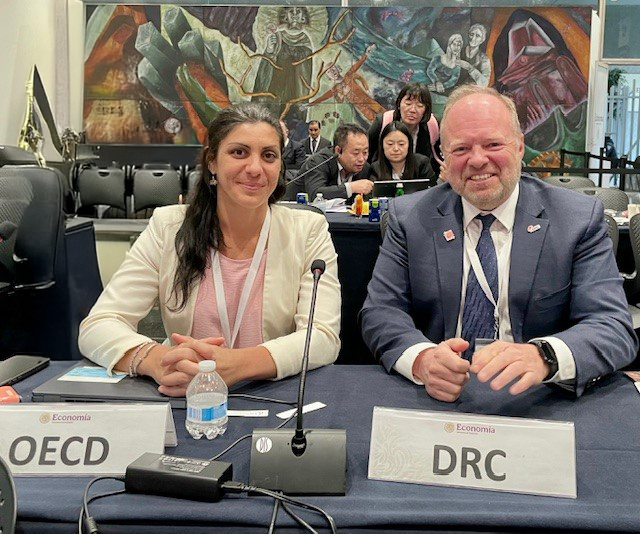In this dispute, the arbitrator concluded that the product was deemed to have been accepted by the Respondent since the Respondent decided to unload and divert it. The arbitrator also found no evidence of a breach of contract by the Claimant. Although the Respondent promptly informed the Claimant regarding the product arriving at high temperatures, all documentation indicated that the product was loaded at the appropriate temperatures at the shipping point and that the product was exposed to undesired temperatures during transit. Furthermore, the Respondent failed to request a federal inspection to prove the product arrived in deteriorated condition or with high temperatures.
The Fruit and Vegetable Dispute Resolution Corporation (DRC) has developed a series of articles summarizing past arbitration decisions. These articles will help members understand how the DRC Rules and Standards apply in a dispute.
The DRC Dispute Resolution Rules state that all DRC arbitrations are private and confidential. As such, the names of all parties, including arbitrators and companies, are not included. A reminder that the DRC’s sole role is as administrator of the arbitration process; the DRC does not participate in any hearings. Therefore, this summary is based solely on the arbitrator’s written decision and may not reflect important information shared with the arbitrator through written briefs or verbal testimony.
ABSTRACT
The arbitration decision relates to a dispute between parties from the United States and Canada regarding the timely and proper rejection of a product by the Respondent, as well as whether the Claimant breached the contract.
Based on the findings and DRC Rules, the arbitrator determined that the Respondent’s diversion of the product indicated acceptance. Furthermore, the Respondent failed to demonstrate that the Claimant breached the contract by shipping cauliflower that was not in proper condition.
This summary provides an essential overview of the arbitration decision and its implications for international commercial disputes.
CASE: DRC File #19139 – Parties Domiciled – United States and Canada
SUMMARY OF FACTS:
On March 1, 2013, the Claimant sold a truckload of cauliflower to the Respondent under four different purchase order numbers (PO#2000008664, PO#611312, PO#611311, and PO#611314). The total invoice amount for the purchase was USD$17,273.60.
Each of the four pickup tickets, the four bills of lading, and the loading sheets were signed by the driver. All documents suggested that the product was pulped at 36°F at the time of loading. Additionally, four temperature recorders were placed on the truck.
The load was delivered on March 6 and was rejected due to high temperatures upon arrival. After the Respondent’s quality control team reviewed the information and temperature recorders, it was deemed a carrier claim.
The refrigerated unit was set to Cycle-Sentry mode, contrary to Respondent’s specifications, which indicate that the refrigerator must be set to Continuous mode. Temperature recorder readings confirmed that the product was exposed to higher than desired temperatures during transit.
A CFIA inspection was requested and performed on March 11, 2013 (four days after the product arrived). The inspection certificate showed that the product was affected by 43% brown discoloration.
The Claimant reported proceeds of USD$8,736.00 from the sale of the cauliflower. When this amount was applied to the original invoice price, the unpaid balance was reduced to USD$8,537.60. Additionally, the Claimant deducted $873.60 from an unrelated purchase, bringing the total claim to USD$9,411.20.
SUMMARY OF ARBITRATOR’S ANALYSIS AND REASONING:
In order for the arbitrator to determine what liability, if any, lies with the Respondent for the truckload of cauliflower it purchased from the Claimant, there are essentially two questions that must be answered:
- Did the Respondent reject the cauliflower delivered by the Claimant?
- Was there a breach of contract by the Claimant?
In answer to the first question, the Respondent agrees that it unloaded the cauliflower after it arrived. According to Section 19 of the DRC Trading Standards, “acceptance” means any action by the consignee that shows they accept the shipment, including unloading or diverting it, unless it’s for inspection by a recognized inspector.
The Respondent’s “FOB Rejection Form” shows that its Quality Assurance (QA) Specialist pulped the cauliflower after it was unloaded. This does not count as an inspection by a recognized inspector (see Section 19 of the DRC Trading Standards). The documents from both parties show that the Respondent also reloaded and diverted the cauliflower. The Claimant states that it didn’t decide to divert the cargo, and the Respondent did not respond to this point. Therefore, it seems the Respondent accepted the cauliflower when it diverted the cargo.
For the above-noted reasons, the arbitrator concluded that the Respondent accepted the cauliflower. Rejecting it after acceptance is seen as an unreasonable rejection under Section 19 of the DRC Trading Standards and is also unfair according to Section 1, General Rules of Conduct, of the same rules. Additionally, Article 2-607 of the Uniform Commercial Code (UCC) states that a buyer who has accepted goods must pay the agreed price minus any penalties for a breach of contract by the seller.
Was there a breach of contract by the Claimant?
The cauliflower was sold on FOB terms, meaning the seller is responsible for delivering the product on board the transport in suitable condition, while the buyer assumes risks after shipment.
The Respondent claimed the cauliflower arrived with elevated pulp temperatures and later asserted it was a carrier-related issue. The Respondent’s Quality Control Specialist reported these higher temperatures, arguing the cauliflower was not pre-chilled properly.
The Claimant countered that the cauliflower was at 36°F upon shipment, supported by the carrier’s signature on the bills of lading. The Respondent claimed this temperature was pre-printed, suggesting it wasn’t verified, but there was no carrier declaration indicating otherwise. Additional documents supported that the cauliflower was indeed pre-cooled properly.
The Claimant argued that elevated temperatures during transit were due to abnormal conditions, specifically related to the refrigeration unit operating in “Cycle-Sentry” mode instead of the recommended Continuous mode for fresh produce.
Thermo King’s download shows that the unit operated in Cycle-Sentry mode, rather than Continuous mode, during the four-day period that the cauliflower was in transit. The carrier’s failure to transport the cauliflower in accordance with Respondent’s instructions establishes that the conditions of transport were not normal. Since the transport conditions deviated from normal, the warranty of proper shipping conditions was void. Thus, the Respondent failed to prove that the Claimant had breached the contract by shipping cauliflower that was not in proper condition. Even if the warranty was applicable, the Respondent did not provide evidence of the cauliflower’s quality at arrival to demonstrate a breach.
ARBITRATOR’S SUMMARY DECISION:
The Respondent was ordered to pay the Claimant the sum of US$8,537.60, plus the US$600.00 filing fee, within 30 days from this Decision and Award date.
DRC COMMENTS:
As a Free on Board (FOB) buyer or receiver, it is essential to know the steps to take if you receive a product that does not meet the contract terms or DRC’s Good Arrival Guidelines. In an FOB transaction, once the carrier picks up the product, the buyer or receiver assumes ownership of the load and bears all risk in transit, including the carrier failing to set the reefer accordingly.
If you notice during unloading that the product does not comply with the contract terms or DRC’s Good Arrival Guidelines, you have the right to reject the load. To maintain this right, you must immediately re-load the product back into the truck and request a government inspection or, if agreed upon, a private inspection. If the inspection report confirms that the product does not meet DRC’s Good Arrival Guidelines or the contract terms, you have three options: you can reject the product and return it to the shipper, renegotiate the contract terms, or claim damages if a renegotiation cannot be agreed upon and rejecting the load is not an option.
We want to remind you that to properly reject a load, you must follow the procedures outlined in DRC’s Trading Standards – Section 10:
- Do not divert a shipment by sending your product to a location other than that indicated in the bill of lading (BoL).
- Do not unload the shipment except for the purpose of inspection.
- Provide your notice of rejection within a reasonable timeframe.
Shippers are responsible for meeting contract terms or ensuring good delivery to the named destination. If you divert the load, you have unilaterally deviated from the original contract and automatically foregone your rejection rights. While you can still claim damages, you will bear the burden of proof showing that any damages to the product would have been the same or similar had it been delivered to the original destination. Once a load is accepted—either through unloading or diversion—the buyer bears this burden of proof. Be aware that any deviation from the original destination, for any reason, constitutes acceptance of the load.
In this case, if it was noted during unloading that the product had arrived with high pulp temperatures, the Respondent should have proceeded to load the product back into the truck and called for a temperature and condition inspection. The next step should have been to advise all parties involved of possible temperature and condition problems, as well as their intention to reject the load. Once the inspection was performed and had corroborated the product arrived with undesirable pulp temperatures and in deteriorated condition, they could have then proceeded to reject the load.
A rejection to the shipper can only be given, provided the transit times and temperatures are normal. A rejection to the carrier must be noted in the Bill of Lading and the transit problems must be described. In this file, the Respondent chose to unload the product and decided to divert it, which meant that the product was considered accepted. Additionally, since the Respondent did not request an inspection in a timely manner, they failed to provide evidence of the bad condition of the load and therefore could not claim proper damages.
ADDITIONAL RESOURCES:
To access the full redacted arbitration decision, click here.
Receiver Duties:
DRC Operating Rules:
Articles:





